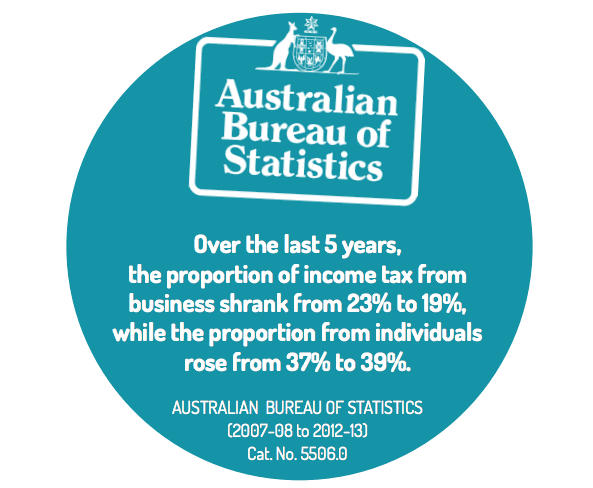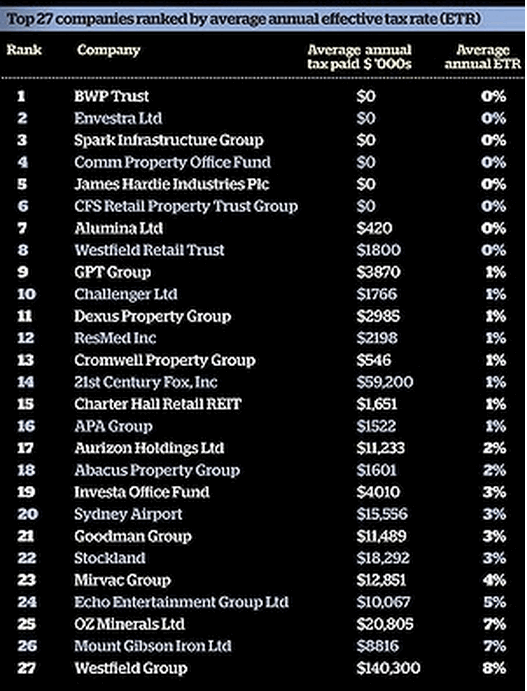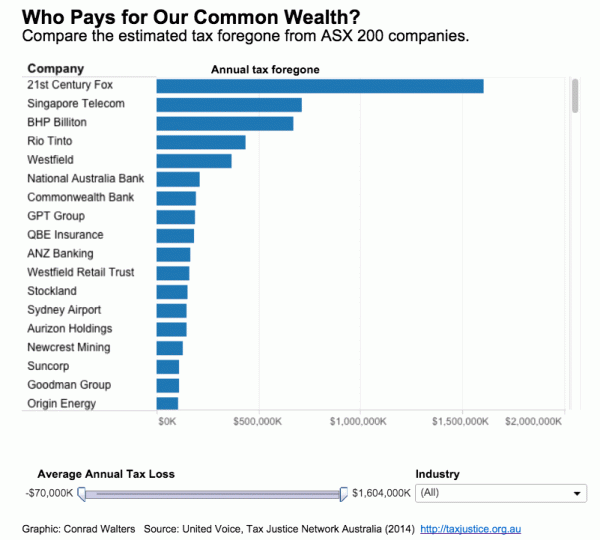
The opening line to the Tax Justice Network’s new report “Who Pays for Our Commonwealth?” states:
if…. the largest Australian listed companies paid taxes at the statutory corporate tax rate of 30%, it would produce an additional $8.4 billion in annual revenues
They go on to say:
- nearly one-third have an average effective tax rate (ETR) of 10% or less;
- 57% disclose subsidiaries in secrecy jurisdictions (tax havens); and
- 60% report debt to equity levels above 75%, which may artificially reduce taxable profits.
The findings of the report are eye opening:
nearly a third of ASX 200 companies pay an effective tax rate of 10% or less, while more than 14%
have an effective tax rate of 0% or actually received a rebate on their tax.
Fairfax has splashed the report on the front page, with a list of the top 27 tax evaders.

Of interest to many will be the fact that 25 of the 27 top tax dodgers have interests in monopoly rights of some form or another. A staggering 16 of 27 are directly related to the land game, as property companies. Six are miners. Two have monopoly rights (Spark Infrastructure and 21st Century Fox). Challenger Super enjoys a government-mandated license in superannuation. Only two of the 27 do not focus on economic rents – the naturally rising value of the earth. That’s the Californian based ResMed (sleep disorders) and James Hardie.
This hints at the sort of reform the G20 should really be aiming for. With property bubbles emerging so soon after the Global Financial Crisis, it is time serious attention was placed on a tax shift away from mobile assets such as capital and labor. By placing taxes on our common wealth, the land and natural monopolies that exist in society, we would soon outrank all other countries for tax efficiencies. The key advantage is that land cannot be hidden in a tax haven. Tax evasion would be virtually impossible, with the least complexity imposed on the economy.
Also of interest is the concern raised over the use of debt to write down taxable profits:

The full report goes into key insights on the level and quality of transparency needed, taking a particular aim at transfer mispricing, thin capitalisation and secrecy jurisdictions, issues that any tax reformer needs to be across.
In terms of the $8.4billion lost to government coffers each year, these companies are the most responsible in terms of total amounts:

Many of these issues could be avoided if genuine tax reform was implemented. Australia deserves the most efficient and equitable system possible. If we follow the money in the above chart, all 18 companies listed enjoy monopoly rights (as well as the elaborate loopholes that allow such tax minimisation). The great tragedy is that many of these companies benefit whether they release new products or not. For example, the value of Australia’s residential land increased $113bn in just the three months of the December 2013 quarter. By enjoying monopoly rights over the earth, they have an enormous advantage over those businesses primarily focused on the production of goods and services. A free lunch with a free pass on taxation seems like fair play according to the government.
These advantages were quantified in the Total Resource Rents of Australia report, which found that all taxes could be replaced with a tax on monopoly rents. Monopolists would pay for their legalised privileged over Australia’s common wealth. By targeting monopolies in real estate, mining and government granted monopolies, wealth gap pressures would reduce. In terms of tax avoidance, placing the tax system on a tax base that can’t be shipped off to a tax haven would circumvent the need for further tax law as the G20 meeting is set to deliver. Then our economic system would favour the hard work we are brought up to believe in, rather than the buy, sell and dodge mentality dominating today’s behaviour.


